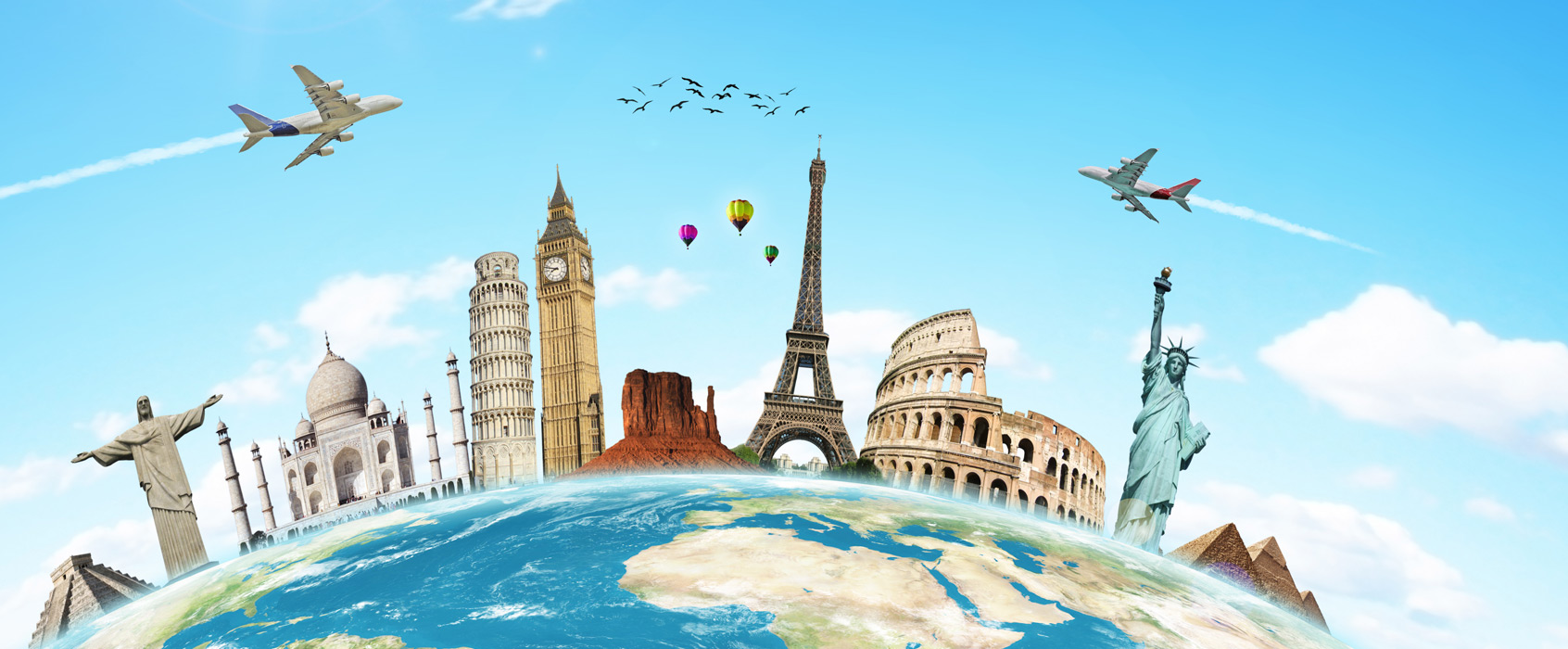Travel: The Ultimate Guide to Exploring the World
Traveling is one of life’s greatest pleasures. It opens up opportunities to explore new cultures, try different foods, and experience the beauty of the world. Whether you’re an avid traveler or someone planning their first trip, there are endless destinations to choose from and countless ways to experience them. In this article, we’ll explore everything you need to know about travel, including tips, benefits, and how to make the most of your journey.

What is Travel?
Travel refers to the act of moving from one location to another, whether it’s for leisure, business, or personal reasons. It can involve short trips within your city or country, as well as long-distance international travel. In today’s globalized world, travel has become an essential part of life, offering countless opportunities for adventure, learning, and growth.
Unlike simply “vacationing,” travel can also include business trips, study abroad experiences, or family visits. The purpose behind your trip might vary, but the benefits of travel are universal.
Types of Travel
Travel can take many different forms, depending on your interests, budget, and the time you have. Here are some popular types of travel:
1. Leisure Travel
This is the most common type of travel and focuses on relaxation, exploration, and recreation. It could involve beach vacations, hiking trips, city breaks, or cultural experiences. Whether you’re lounging on a sunny beach or exploring a historic city, leisure travel offers an escape from the daily grind.
2. Business Travel
Business travel is necessary for meetings, conferences, and professional networking. While it may involve some sightseeing, business trips are typically focused on work-related tasks. Many companies now prioritize comfort and efficiency, ensuring that employees have a seamless travel experience.
3. Adventure Travel
For the thrill-seekers, adventure travel offers high-energy activities such as trekking, white-water rafting, or mountain climbing. Destinations can vary, from the Amazon rainforest to the peaks of the Himalayas. This type of travel often involves physical challenges and the chance to explore remote or rugged landscapes.
4. Cultural Travel
If you want to immerse yourself in new cultures, then cultural travel is for you. Visiting museums, attending local festivals, or exploring historical landmarks allows you to experience the traditions, art, and heritage of different regions. This type of travel broadens your understanding of the world and fosters respect for different cultures.
5. Eco-Tourism
With sustainability becoming a global focus, eco-tourism has risen in popularity. It involves traveling in a way that minimizes environmental impact while supporting local communities. Eco-friendly accommodations, wildlife conservation programs, and environmentally responsible activities are key components of eco-tourism.

The Benefits of Traveling
Travel offers a host of benefits that can enrich your life in ways you might not even realize. Here are a few reasons why traveling should be on your bucket list:
1. Personal Growth
Travel exposes you to new experiences, challenges, and perspectives. Navigating a foreign city, overcoming language barriers, or managing unfamiliar situations can lead to significant personal growth. You’ll gain confidence, resilience, and adaptability—skills that are invaluable in everyday life.
2. Broadens Your Horizons
Travel allows you to experience the world in all its diversity. You’ll meet new people, try new foods, and learn about different ways of life. This can help you become more open-minded and appreciative of other cultures and viewpoints.
3. Stress Relief
Whether you’re lounging on a beach or exploring a new city, traveling provides a break from the stresses of everyday life. Vacationing offers an opportunity to disconnect from work, recharge, and refresh your mind and body.
4. Creates Lasting Memories
Some of the best memories are created while traveling. Whether it’s an adventure with friends, a romantic getaway, or a solo journey of self-discovery, the experiences you have during your travels will stay with you for a lifetime.
5. Strengthens Relationships
Traveling with friends or family can strengthen your relationships. Shared experiences, laughter, and overcoming challenges together create bonds that last. Traveling with a partner also offers a great way to connect and experience new things as a couple.
How to Plan a Successful Trip
Planning is key to ensuring that your trip is both enjoyable and stress-free. Here are some essential steps to consider when planning your next adventure:
1. Set a Budget
Before you start booking flights or hotels, it’s essential to set a budget. Determine how much you’re willing to spend on flights, accommodation, food, and activities. Having a budget in mind helps prevent overspending and allows you to plan accordingly.
2. Choose Your Destination
Next, decide where you want to go. Research destinations that align with your interests and budget. Websites like TripAdvisor or Lonely Planet can offer helpful insights into popular destinations and activities.
3. Book Your Flights and Accommodation
Once your destination is set, start booking flights and accommodation. Many websites, such as Booking.com, Expedia, and Travelocity, offer great deals on flights, hotels, and vacation packages. Be sure to compare prices and read reviews before making a decision.
4. Create an Itinerary
It’s important to have a loose plan of what you want to do during your trip. Create an itinerary that includes key activities, tours, and free time. However, make sure to leave room for spontaneity and unexpected discoveries.
5. Pack Smart
Packing can be one of the most stressful parts of traveling, but it doesn’t have to be. Make a checklist of essential items, pack light, and remember to check the weather forecast for your destination. Don’t forget travel essentials like your passport, travel insurance, and any necessary medications.
6. Prepare for the Unexpected
While planning is important, be prepared for things to not always go as expected. Make sure you have backup plans in place, such as knowing where the nearest hospital or embassy is in case of an emergency.
Travel Tips for First-Timers
Traveling for the first time can be both exciting and nerve-wracking. Here are a few tips to help you have a smooth and enjoyable experience:
1. Learn Basic Phrases
If you’re traveling to a non-English speaking country, learning a few basic phrases in the local language can go a long way. Simple greetings, “thank you,” and “how much” can help you navigate more easily.
2. Use Travel Apps
Take advantage of travel apps to make your trip more convenient. Apps like Google Maps, TripIt, and Skyscanner help you find directions, organize your itinerary, and track flight prices.
3. Stay Safe
Make sure to keep your belongings safe, especially in busy tourist areas. Use a money belt, keep your passport in a secure location, and avoid flashing valuables in public. It’s also a good idea to have the local emergency numbers saved on your phone.
4. Get Travel Insurance
Travel insurance is essential for peace of mind during your trip. It covers a range of unforeseen circumstances, such as trip cancellations, medical emergencies, or lost luggage.

FAQs About Travel
1. What’s the best time to travel?
The best time to travel depends on your destination. Some places are ideal during specific seasons (e.g., summer for beaches or winter for ski resorts). Check the weather and peak seasons for the destination you plan to visit.
2. Do I need a visa to travel internationally?
This depends on your nationality and the country you’re visiting. Be sure to check the visa requirements of your destination well in advance. Websites like VisaHQ offer detailed information on visa policies.
3. How can I save money while traveling?
To save money on your trip, consider booking flights and hotels in advance, traveling off-peak, or staying in budget accommodations like hostels or guesthouses. Additionally, local transportation like buses or trains is often cheaper than taxis.
4. What should I do if I lose my passport while traveling?
If you lose your passport while traveling, contact your embassy or consulate immediately. They can issue you a replacement passport or travel document to get you back home.
5. How do I avoid jet lag?
To minimize jet lag, try adjusting your sleep schedule a few days before your trip, stay hydrated, and avoid caffeine. Once you arrive, spend time in natural light to help your body adjust to the new time zone.
Conclusion
Travel is one of the most rewarding experiences you can have. Whether you’re exploring a nearby town or traveling across continents, the world has so much to offer. With the right planning and preparation, you can enjoy a stress-free trip filled with unforgettable memories.
So, what are you waiting for? Start planning your next adventure today, and get ready to explore the world!
For more travel tips and inspiration, visit our Travel Blog.
